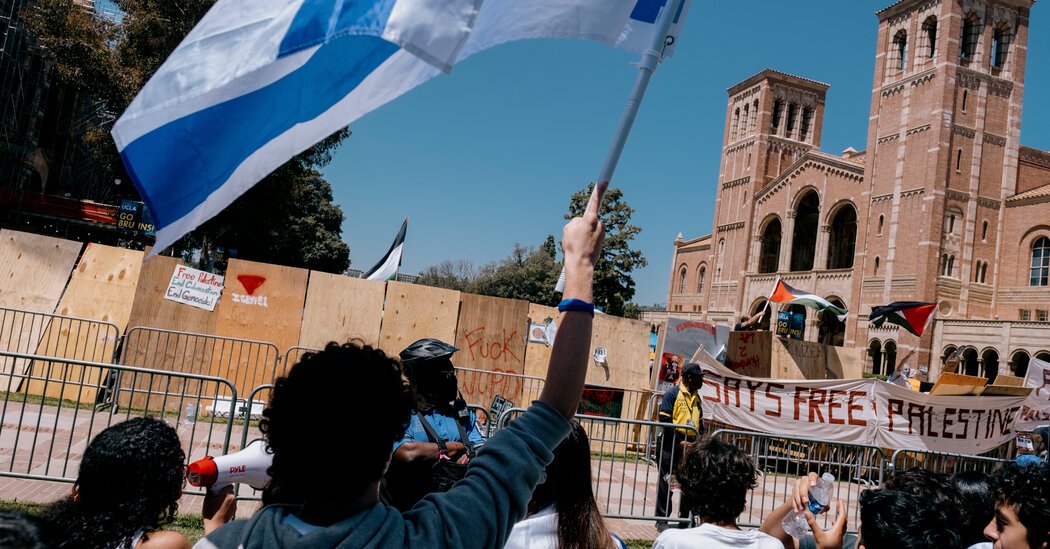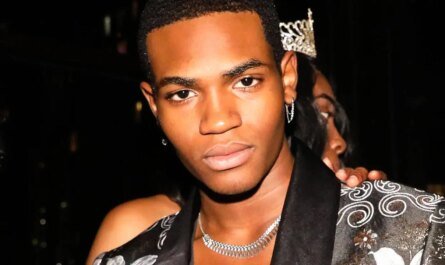Officials at the University of California, Los Angeles, declared a pro-Palestinian encampment illegal for the first time on Tuesday night and warned protesters that they faced consequences if they did not leave.
It was an abrupt turn at a campus that had been among the most tolerant in the nation, abiding by a University of California practice of avoiding law enforcement action unless “absolutely necessary to protect the physical safety of our campus community.”
After protesters established the encampment on Thursday in the shadow of Royce Hall, university officials did not intervene and said they wanted to support free speech rights while minimizing campus disruption.
But patience appeared to run out after violent confrontations in recent days between pro-Palestinian demonstrators and Israel supporters that required the campus police to intervene. Administrators also took issue with instances in which protesters used metal gates and human walls to control access to campus walkways and entrances, videos of which had circulated on social media.
In a statement on Tuesday, Gene Block, the chancellor, called such tactics “shocking and shameful” and said that protesters who engaged in such behavior could face suspension or expulsion.
“U.C.L.A. supports peaceful protest, but not activism that harms our ability to carry out our academic mission and makes people in our community feel bullied, threatened and afraid,” Mr. Block said. “These incidents have put many on our campus, especially our Jewish students, in a state of anxiety and fear.”
In a statement, the U.C.L.A. Palestinian Solidarity Encampment, which says it is made up of students, faculty members and community members, called the university’s declaration on Tuesday night a “cowardly intimidation tactic” and said it did not plan to disband.
“This repression tactic is a continuation of a long history of attempts to shut down student activism and silence pro-Palestinian voices,” the group said. “We will not leave. We will remain here until our demands are met.”
Jewish activists have had a larger presence at U.C.L.A. than at other campus demonstrations in California, and dueling protests have been particularly intense.
On Sunday, the Israeli American Council, which has denounced pro-Palestinian protests on college campuses as “overtly antisemitic,” hosted a rally at U.C.L.A. that drew thousands of people. Organizers set up a stage and a large screen near the pro-Palestinian encampment and then led prayers, hosted speakers and welcomed performers who sang Israeli pop songs.
But tempers also flared, with shouting matches and scuffles between the two sides, including altercations after an encampment barrier was breached.
“U.C.L.A. has a long history of being a place of peaceful protest, and we are heartbroken about the violence that broke out,” Mary Osako, the university’s vice chancellor for strategic communications, said in a statement that day, vowing to increase security.
On Monday night, another fight broke out between two groups of protesters after about 60 pro-Israel demonstrators attempted to enter the pro-Palestinian encampment. Campus police officers had to break up the dispute.
Pro-Israeli demonstrators began arriving at the encampment almost immediately after it was first set up. For the past several days, they have waved Israeli flags, spoken through megaphones, played music through loudspeakers and held up images of some of the hostages captured by Hamas on Oct. 7.
On Tuesday, a large screen near the encampment played footage from the Hamas-led terrorist attack on Israel. At noon, a plane flying a “Jewish Lives Matter” banner circled the campus.
Many Jewish groups say the campus protests have created a climate that is hostile toward Jewish students. The Israeli American Council has responded by holding “support rallies” across the nation similar to the one Sunday at U.C.L.A., including events in Atlanta and Orange County, Calif., on Wednesday.
Asher Taxon, a freshman at U.C.L.A. who is Jewish, said the Sunday rally had given him a much-needed boost.
“It was great, it felt like we’re still here and that they can’t get rid of us,” Mr. Taxon said. “It was nice seeing other Jews and Israelis singing and dancing and showing that we are supported.”
Pro-Palestinian demonstrators said Tuesday that the daily counter-demonstrations at U.C.L.A. had been emotionally and mentally exhausting.
The “actions and behavior of these counterprotesters is indicative of the treatment of the people on the ground in Gaza,” said Kaia Shah, a researcher and a recent U.C.L.A. graduate. “What this has done to the people in our encampment is made them even more passionate about our cause.”




